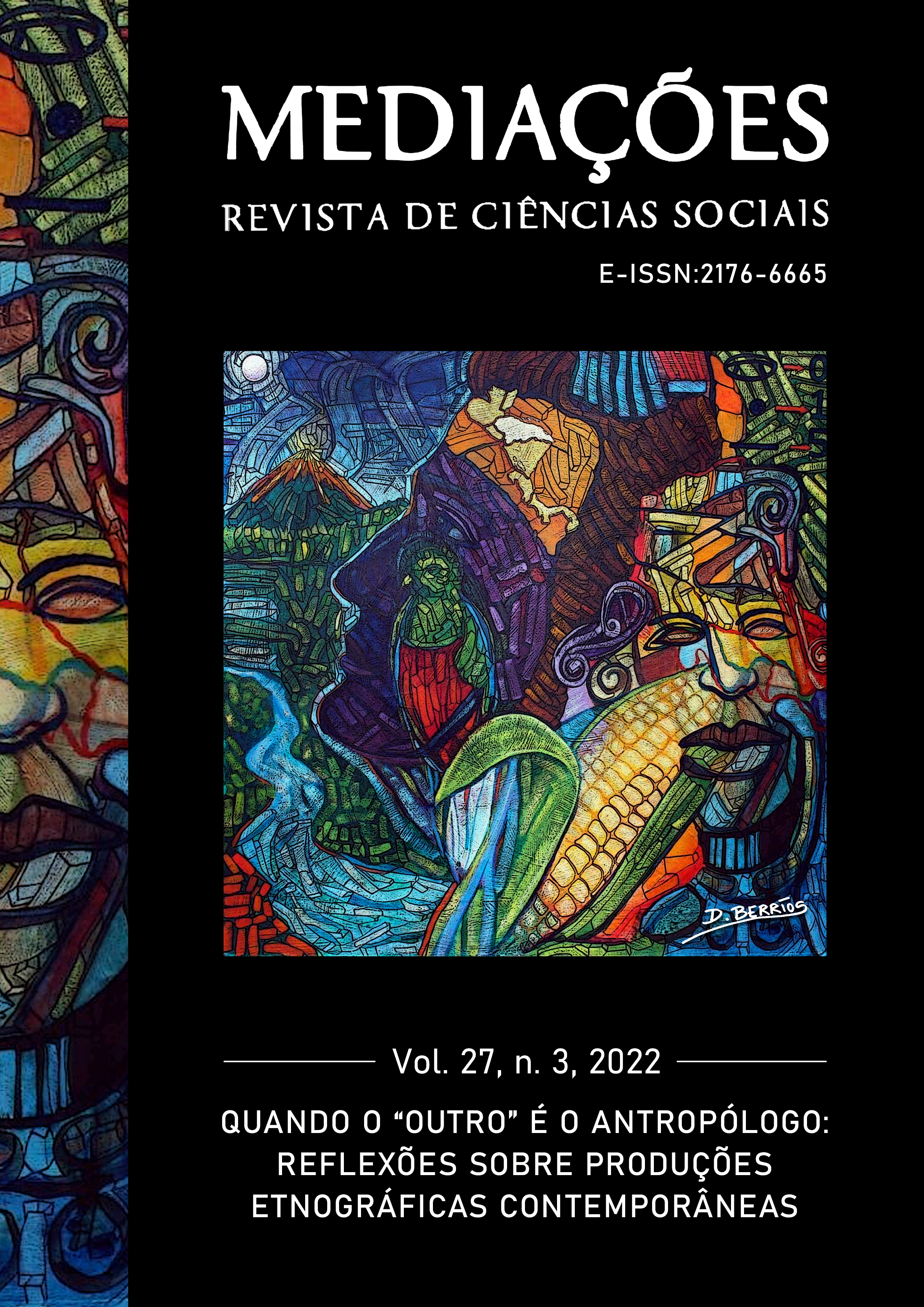Travesty Nature. Fantasies about the Absence of Taxonomies and Fixed Identities
DOI:
https://doi.org/10.5433/2176-6665.2022v27n3e45046Keywords:
transvestite nature, queer nature, taxonomies, identitiesAbstract
This article studies the modern notion of nature from the perspectives of different contemporary authors such as Morton, Haraway, Latour, Stengers, Viveiros de Castro, Escobar and Barad. The objective is to demonstrate the problems that this concept entails and the proposals made by the aforementioned philosophers. In a second moment, a set of documents that are analyzed, allow an approach to the Aldea Rosa of Buenos Aires in order to propose the idea of travesti nature. It is a situated notion that highlights the absence of taxonomic orders and fixed identities, while offering a possibility to reimagine the world.
Downloads
References
BAGEMIHL, B. Biological exuberance: animal homosexuality and natural diversity. New York: St. Martin's Press, 2000.
BAPTISTE, B. Nada más queer que la naturaliza. abr. 2019. Disponível em: https://www.goethe.de/prj/hum/es/dos/kos/21528411.html. Acesso em: 10 out. 2020.
BARAD, K. Meeting the universe halfway: quantum physics and the entanglement of matter and meaning. Durham: Duke University Press, 2007. DOI: https://doi.org/10.2307/j.ctv12101zq
BARAD, K. Nature's queer performativity. Kvinder, Køn&Forskning, København, v. 1-2, p. 25-53, 2012. DOI: https://doi.org/10.7146/kkf.v0i1-2.28067
BERKINS, L. Las travestis siempre estuvimos aquí. Página/12, Caba, 11 may 2012.
CARMAN, M. La Aldea Gay. En: CARMAN, M. Las trampas de la naturaleza: medio ambiente y segregación en Buenos Aires. Buenos Aires: CLACSO, 2011. p. 105-166.
ESCOBAR, A. El final del salvaje: naturaleza, cultura y política en la antropología contemporánea. Santafé de Bogotá: CEREC: Instituto Colombiano de Antropología, 1999.
ESCOBAR, A. Política cultural y biodiversidad: estado, capital y movimientos sociales en el Pacífico colombiano. En: URIBE, C. A. et al. (ed.). Antropología hecha en Colombia. Popayán: Universidad del Cauca, 2017. p. 617-642.
ESCOBAR, A. Sentipensar con la tierra: nuevas lecturas sobre desarrollo, territorio y diferencia. Medellín: Ediciones Unaula, 2014.
GAARD, G. Toward a queer ecofeminism. Hypatia, Cambridge, v. 12, n. 1, p. 114-137, 1997. DOI: https://doi.org/10.1111/j.1527-2001.1997.tb00174.x
HARAWAY, D. Cuando las especies se encuentran: introducciones. Tabula Rasa, Bogotá, n. 31, 15 jul. 2019a.
HARAWAY, D. Las promesas de los monstruos: una política regeneradora para otros inapropiados/ble. Política y Sociedad, Madrid, v. 30, p. 121-163, 1999.
HARAWAY, D. Manifiesto de las especies de compañía. Tradución: Isabel Mellén. Córdoba: Bocavulvaria, 2017.
HARAWAY, D. Seguir con el problema: generar parentesco en el Chthuluceno. Tradución: Helen Torres. Bilbao: Consonni, 2019b.
LA ISLA bonita. Página/12, Caba, 4 nov. 2011.
LATOUR, B. Cara a cara con el planeta: una nueva mirada sobre el cambio climático alejada de las posiciones apocalípticas. Tradución: Ariel Dilon. Ciudad de Buenos Aires: Siglo XXI, 2017.
LATOUR, B. Nunca fuimos modernos: ensayos de antropología simétrica. Tradución: Víctor Goldstein. Buenos Aires: Siglo XXI, 2012.
LEMEBEL, P. Los mil nombres de María Camaleón. En: LEMEBEL, P. Loco afán: crónicas de sidario. Contraseñas. Barcelona: Anagrama, 2000.
MOLINA MERAJVER, S. Entrenosotro. [S. l.: s. n.], 1998.
MORTON, T. Ecology without nature: rethinking environmental aesthetics. Cambridge, Mass: Harvard University Press, 2007.
SCHWARZBÖCK, S. Los espantos: estética y postdictadura. Buenos Aires: Cuarenta Ríos, 2015.
STENGERS, I. En tiempos de catástrofes: cómo resistir la barbarie que viene. Tradución: Víctor Goldstein. Buenos Aires: Futuro Anterior y Nuevos Emprendimientos Editoriales, 2017.
SVAMPA, M. Antropoceno: lecturas globales desde el Sur. Córdoba: La Sofía Cartonera, 2019.
SWYNGEDOUW, E. ¡La naturaleza no existe! La sostenibilidad como síntoma de una planificación despolitizada. Urban, [S. l.], v. NS01, p. 41-66, 2011.
VAN DE COUTER, J. Mía. [S. l.: s. n.], 2011.
VAN DOOREN, T. Flight ways: life and loss at the edge of extinction. New York: Columbia University Press, 2014. DOI: https://doi.org/10.7312/columbia/9780231166188.001.0001
VERRAN, H. Working with Those Who Think Otherwise. Common Knowledge, v. 20, n. 3, p. 527-539, 2014. DOI: https://doi.org/10.1215/0961754X-2733075
VIVEIROS DE CASTRO, E. La mirada del jaguar: introducción al perspectivismo amerindio. Tradução: Santiago Sburlatti. Buenos Aires: Tinta Limón, 2014.
VIVEIROS DE CASTRO, E. Perspectivismo y multinaturalismo en la América indígena. En: HUERTAS CASTILLO, B.; GARCÍA ALTAMIRANO, A. (ed.). Los pueblos indígenas de Madre de Dios: historia, etnografía y coyuntura. Documento. Tradución: Rosa Álvarez y Roger Sansi. Copenhague: IWGIA, 2003.
Published
How to Cite
Issue
Section
License
Copyright (c) 2022 Hernán Lopez Piñeyro

This work is licensed under a Creative Commons Attribution 4.0 International License.
Copyright on articles published in Mediações belongs to the author(s): in the case of partial or entire republication of the original publication, we ask author(s) to indicate the original publication in the periodical.
Mediações uses the Creative Commons Attribution 4.0 International license, which allows Open Access, enabling any user to read, download, copy and disseminate its content so long as adequately referenced.
The opinions expressed by the author(s) are their sole responsibility.
































